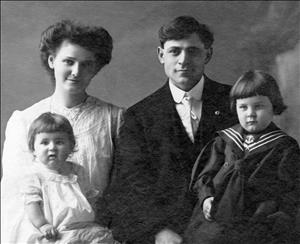In 1914, the original Green Lake Theater opens in Seattle's Green Lake neighborhood at 312 East 72nd Street. The theater, one of about 50 in Seattle at the time, operates from 1914 until the "talkies" arrive in 1928. Briefly called the Classic Theatre, it typifies the early theaters of the day. A single operator projects "photoplays" and silent movies on evenings and on Sunday afternoons. This essay includes memories of going to the movies at the Green Lake Theater by Blanche Caffiere (1906-2006) and Dorothea Nordstrand (1916-2011), interviewed as part of the Green Lake Park Alliance Oral History Project.
Blanche Caffiere, age 94, who arrived at Green Lake with her family in 1907, recalled a night at the movies when she was a young girl:
"Margaret Boyd was my best friend. Her father was the tailor at Green Lake, and his shop was located on 72nd up from the pool hall. Then there was a little jewelry store, I think, next to Mr. Boyd’s tailor shop, and then a grocery store and, oh yes, the movie show. The Green Lake movie show was 10 cents, and I remember I went there with my friend one night. In those days you could just go around when you were young and have it get dark and not worry, but nobody would do that now, let two little girls and a little brother go. I saw the brother not too long ago, and he said, 'I’ll never forget the time that you and Cat took me to the Green Lake show, and you got down there and Cat didn’t have enough money for me to go in, so you and she went in and left me standing out-side.' When the show was half over, they let this poor little boy in. I had forgotten that, but of course he hadn’t."
Dorothea Nordstrand and her family came to Green Lake in 1919 from a homestead in Eastern Washington. She recalled an experience at the theater when she was four:
"One of the things that we did for fun around here, there was a theater in Green Lake that used to be on the hillside, halfway between Woodlawn Avenue and East Green Lake Way. It was the old Green Lake theater. They had on Friday nights a promotional thing called Northwest Products. Between the showing of pictures they would have tickets you'd get the stubs of were called and certain people would get bags of groceries full of products that were made here in the northwest."It cost a dime to go to the show at that time. Jack and Florence were allowed to go and take me along because I didn't cost anything. Twice I remember we won a bag of groceries to take home, which insured we could keep doing this. They also had in connection with Northwest Products a voluntary ... oh, you could get up on the stage and try for a prize. The prize winner would be selected by the sound of the applause from the audience. The manager would hold his hand over the person's head. The one that got the most applause was the winner.
"So, this one night while we were down there, Florence and Jack decided that since I was four I might be sort of appealing. So, they put me up on the stage and I sang a song called 'Twilight Is Stealing.' My funny little piping voice evidently hit a chord with a few people, and when it came time for the applause I got more than anybody.
"So, I won a red Coaster wagon, which was something I never would have had in any other way with the family finances the way they were at that time. As it was, I didn't get to keep it very long, anyway, because my brother appropriated it and used it for delivering groceries. But that was fine with me because it was helping, and we all had to."
With the arrival of the talking pictures and the requirement of expensive new projectors and sound equipment, many neighborhood theaters abruptly went out of business for lack of capital. The original Green Lake Theater went out of business in 1928. Although demand was great for the new feature length films that soon became available, Green Lake residents had to go to other neighborhoods to see Fred Astaire and the Marx Brothers, until the second Green Lake Theater opened in 1937.

